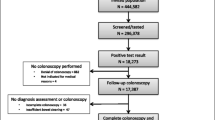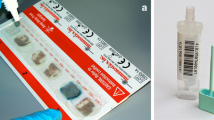Abstract
Background
The quantitative immunochemical faecal occult blood test (qFOBT) has been shown to be an accurate method of identifying significant colorectal neoplasia including cancer and advanced adenomas. This study reports the results of a Singapore population-based colorectal cancer screening event using the qFOBT.
Methods
This event was held as part of a colorectal cancer awareness exhibition. All asymptomatic individuals above the age of 40 years with no previous colorectal cancer screening in the last 1 year were invited to participate. Eligible participants were screened using two consecutive qFOBTs with a positive faecal haemoglobin threshold taken at 100 ng/mL. Participants with at least one positive qFOBT result were recalled and advised to undergo colonoscopy. Endoscopic polypectomy or surgery was performed according to colonoscopic findings.
Results
A total of 751 (55% male, 45% female) participants with a median age of 53 years (range, 40–85 years) took part in the screening event. Five hundred and forty (72%) participants returned the qFOBT samples, of which 57 (11%) tested positive. Fifty-two of these participants proceeded to colonoscopy. Three participants had sigmoid cancer and 12 had advanced polyps, all of which were located distally in the sigmoid colon or rectum. Five of the participants required surgery for colorectal neoplasia and all recovered well without complications.
Conclusion
The qFOBT at a positive faecal haemoglobin threshold of 100 ng/ml has a high positive predictive value and is an effective screening tool for colorectal cancer in an Asian population.


Similar content being viewed by others
References
Seow A, Koh WP, Chia KS, Shi LM, Lee HP, Shanmugarrathan K (2004) Trends in cancer incidence in Singapore 1968–2002. Singapore Cancer Registry Report No. 6:2004
Wong MT, Eu KW (2007) Rise of colorectal cancer in Singapore: an epidemiological review. ANZ J Surg 77:446–449
Sung JJ, Lau JY, Young GP et al (2008) Asia Pacific consensus recommendations for colorectal cancer screening. Gut 57:1166–1176
Mandel JS, Bond JH, Church TR et al (1993) Reducing mortality from colorectal cancer by screening for fecal occult blood. Minnesota Colon Cancer Control Study. N Engl J Med 328:1365–1371
Kronborg O, Fenger C, Olsen J, Jørgensen OD, Søndergaard O (1996) Randomised study of screening for colorectal cancer with faecal-occult-blood test. Lancet 348:1467–1471
Hardcastle JD, Chamberlain JO, Robinson MH et al (1996) Randomised controlled trial of faecal-occult-blood screening for colorectal cancer. Lancet 348:1472–1477
Levin B, Lieberman DA, McFarland B et al (2008) Screening and surveillance for the early detection of colorectal cancer and adenomatous polyps, 2008: a joint guideline from the American Cancer Society, the US Multi-Society Task Force on Colorectal Cancer, and the American College of Radiology. Gastroenterology 134:1570–1595
Young GP, St John DJ, Winawer SJ, Rozen P, WHO (World Health Organization), OMED (World Organization for Digestive Endoscopy) (2002) Choice of fecal occult blood tests for colorectal cancer screening: recommendations based on performance characteristics in population studies: a WHO (World Health Organization) and OMED (World Organization for Digestive Endoscopy) report. Am J Gastroenterol 97:2499–2507
Allison JE, Sakoda LC, Levin TR et al (2007) Screening for colorectal neoplasms with new fecal occult blood tests: update on performance characteristics. J Natl Cancer Inst 99:1462–1470
Levi Z, Rozen P, Hazazi R et al (2007) A quantitative immunochemical fecal occult blood test for colorectal neoplasia. Ann Intern Med 146:244–255
Smith A, Young GP, Cole SR, Bampton P (2006) Comparison of a brush-sampling faecal immunochemical test for haemoglobin with a sensitive guaiac-based fecal occult blood test in detection of colorectal neoplasia. Cancer 107:2152–2159
Morikawa T, Kato J, Yamaji Y, Wada R, Mitsushima T, Shiratori Y (2005) A comparison of the immunochemical fecal occult blood test and total colonoscopy in the asymptomatic population. Gastroenterology 129:422–428
Vilkin A, Rozen P, Levi Z et al (2005) Performance characteristics and evaluation of an automated-developed and quantitative, immunochemical, fecal occult blood screening test. Am J Gastroenterol 100:2519–2525
Kim JH, Chung HJ, Yoon NS, Pyo YJ, Bae HG, Kim MN (2007) Evaluation of the OC-SENSOR neo system for testing fecal occult blood. Korean J Lab Med 27:210–215
Wong WM, Lam SK, Cheung KL et al (2003) Evaluation of an automated immunochemical fecal occult blood test for colorectal neoplasia detection in a Chinese population. Cancer 97:2420–2424
Ciatto S, Martinelli F, Castiglione G et al (2007) Association of FOBT-assessed faecal Hb content with colonic lesions detected in the Florence screening programme. Br J Cancer 96:218–221
Guittet L, Bouvier V, Mariotte N et al (2007) Comparison of a guaiac based and an immunochemical faecal occult blood test in screening for colorectal cancer in a general average risk population. Gut 56:210–214
Greenberg PD, Bertario L, Gnauck R et al (2000) A prospective multicenter evaluation of new fecal occult blood tests in patients undergoing colonoscopy. Am J Gastroenterol 95:1331–1338
Acknowledgments
We would like to thank Nagase Singapore (Pte) Ltd, for sponsoring the qFOBT test kits and the loan of the OC-SENSOR DIANA faecal occult blood analyser.
Author information
Authors and Affiliations
Corresponding author
Rights and permissions
About this article
Cite this article
Fu, WP., Kam, MH., Ling, WM. et al. Screening for colorectal cancer using a quantitative immunochemical faecal occult blood test: a feasibility study in an Asian population. Tech Coloproctol 13, 225–230 (2009). https://doi.org/10.1007/s10151-009-0515-1
Received:
Accepted:
Published:
Issue Date:
DOI: https://doi.org/10.1007/s10151-009-0515-1




